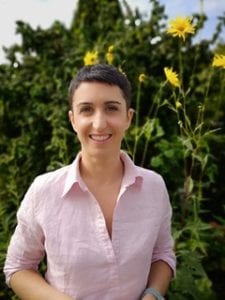Dr Anna Bonetto chooses Rolfing
 Rolfing UK interviews Dr Anna Bonneto
Rolfing UK interviews Dr Anna Bonneto
Before you became a Certified Rolfer, what was your profession? Did you have a specialism?
I am a paediactric intensive care Doctor working with Children.
For how long did you work in this profession and did you work in the UK?
I qualified as a Doctor in Italy in 2004 and practiced there, but moved to the UK in 2010 and worked in paediatric care until October 2017.
Have you any other qualifications in complementary therapy?
Besides being a Certified Rolfer, I also have a degree (Bsc) in Herbal Medicine from the University of Westminster (London).
Do you still work in this profession as well as a Certified Rolfer?
I did work as Pediatrician in Children Intensive Care until October 2017. In 2018, I decided to take some time off my medical practice to build up my Rolfing practice, but also to study and research ways to integrate what I have learned through Rolfing. I am now about to resume working as a medical doctor in Germany, where I have been offered an opportunity to work in an Integrative practice.
Can you explain what an integrative practice is?
In an integrative or integrated practice, conventional practice and ‘complementary and alternative’ treatments are available to create therapeutic plan that meet the patient needs (and health outcomes). Patient and health care professional tend to work in the spirit of an equal partnership, not only to treat a condition but also to restore or improve health.
What made you interested in becoming a Rolfer?
At first it was a question of my own health, I ended up by chance in a Rolfer’s practice, while I was trying different treatments to sort out a painful shoulder issue. The pain subsided and disappeared after a few sessions, which was obviously great. But Rolfing also led me to a professional and personal crisis.
During the Rolfing sessions, I was not treated as a broken machine in need of fixing (although the fixing that was necessary also happened), but as a person in need of being understood in its intricate complexity and in need of understanding myself. Was that why Rolfing was successful in the treatment of my pain? Could it be that the awareness of what we do, how we are, how we see the world has a significant impact on our health? If so, what kind of person and what kind of doctor did I want to be from then on in? It was really the attempt to answer these questions that made me decide to do the Rolfing training.
What do you think are the main strengths of Rolfing?
Rolfing recognises that structure, function, perception, and the pull of the gravity force shape the unique form of each human body/being. This awareness allows Rolfing to see beyond biomechanics and often to reach to root of many structural, postural and movement issues.
Within the field of Rolfing, do you specialise in certain areas or conditions?
I have only been practicing Rolfing two years, which is too little time to specialise in any field. As a paediatrician however, I would like to specialise in Rolfing for children.
Do you notice a difference in approach to health, working as a Rolfer, compared to that of a Doctor?
Conventional medicine and Rolfing are based on different paradigms. Conventional medicine is disease-based: a diagnosis leads to a usually standardised treatment of the identified disease (or of its symptoms). It is a great approach, it saves lives and helps in many cases (e.g. acute conditions) but not in all. Rolfing, and many other healing practices are based on supporting health and the natural capacity of the body to heal itself. I find many conditions, especially the chronic ones, benefit greatly from this approach. But both approaches are necessary and work best when integrated.
Do you think conventional medicine and Rolfing can work together?
I know they can work well together, or at least that has been my personal experience so far.
Where do you see Rolfing as being particularly effective, for what conditions?
Although Rolfing is not considered a therapy or treatment for any specific condition, in my experience I have found it effective reduce pain and discomfort and improve quality of movement (and of life) in adult and children with many different conditions such as scoliosis and chronic musculoskeletal pain of various origin. I found it also helpful to support the therapeutic journey of those people who are struggling with PTSD and anxiety disorders, where a quality of embodiment and body awareness often contribute to the success of their psychotherapy.
For further details please see Anna’s website, www.rolfing-phytoherapy.com or email at [email protected].
